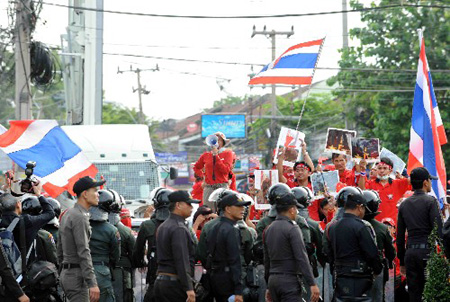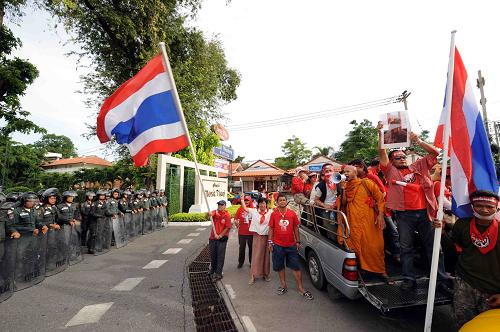|

|
|
Anti-government protesters confront policemen outside the place where foreign delegations attending the ASEAN related summits are stationed, in Pattaya, Thailand, April 11, 2009. A scheduled 12th ASEAN-China Summit was not held as scheduled at 9:00 am on Saturday due to anti-government "red shirt" blocked all main roads in Pattaya. |
The Association of Southeast Asian Nations (ASEAN) related summits scheduled on April 10-12 have been canceled because of security reason, the Thai government announced in Pattaya, Thailand Saturday.
The summits have been postponed to a later date, said Panitan Waltanyakorn, the acting government spokesman. He did not give a specific new date.
Before the announcement of cancellation of summits, the "red- shirted" protesters had broken into the summits venue and the media center, which made the summits impossible.
In the meantime, the Thai government has declared state of emergency in Chonburi province. After the emergency decree, the protesters have begun to retreat from the media center and the meeting venue.
|

|
|
Anti-government protesters confront policemen outside the place where foreign delegations attending the ASEAN related summits are stationed, in Pattaya, Thailand, April 11, 2009. A scheduled 12th ASEAN-China Summit was not held as scheduled at 9:00 am on Saturday due to anti-government "red shirt" blocked all main roads in Pattaya. |
Backgrounder: The "red-shirts" in Thailand
The United Front of Democracy Against Dictatorship (UDD), or the "red-shirts", is a major anti- government force in Thailand. Its members and supporters are often referred to informally as "red shirts" since they are known for wearing red clothes during anti-government protests.
The group, formerly the Democratic Alliance Against Dictatorship (DAAD) established in 2006, was to fight against People's Alliance for Democracy (PAD) and support the ousted former Thai Prime Minister Thaksin Shinawatra, who was deposed by the military coup on September 19, 2006. During the military regime in 2006-2007, the DAAD frequently organized rallies against the government.
The red-shirts movement cooled down after the Thaksin- affiliated parties, led by Samak Sundaravej, won the 2007 December general election, and resumed their rallies against the anti- Thaksin PAD protests since May 2008.
The main leaders of the UDD are members of the opposition Puea Thai Party and some social activists. Its core leaders includes Jatuporn Prompan, Veera Musikhapong and Nattawut Saikua.
UDD is known for its support for the former premier Thaksin and the former two pro-Thaksin administrations led by Samak and Somchai. When the pro-Thaksin ruling People's Power Party (PPP) was dissolved by Thailand's Constitution Court in December 2008, and Abhisit Vejjajiva of the minority Democrat Party was elected prime minister later, the red-shirts turned up in force to hold rallies again.
They claimed the election was unfair and urged the prime minister to resign, dissolve the parliament and hold a new general election.
The major strongholds of UDD apparently are the northern and north-eastern provinces of Thailand.
On March 26, 2009, UDD supporters began demonstrating in large numbers around Bangkok. On April 8, in a so-called "showdown" by UDD, up to 100,000 red-shirts assembled in Bangkok, demanding Abhisit and three Privy Council members to resign.
(Xinhua News Agency April 11, 2009)